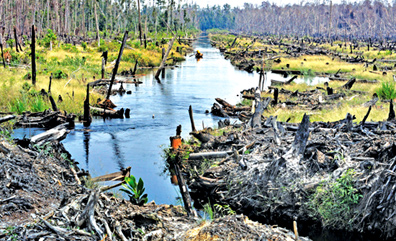Indonesian forests on frontline of climate debate
With the approach of global climate talks in Copenhagen, activists
are hoping to draw world attention to their fight to save the last
tropical forests on Indonesia’s Sumatra island.
If successful, they believe they will slow global warming by
preventing the carbon trapped in the forest’s timbers and dense peat
soils from being released through logging and clearing.
 |
|
A fisherman paddling his boat through
devastated peatlands forest in Indonesia’s Pangkalan Bunut
in Riau province. AFP |
In the complicated argot of climate negotiations, the idea is called
REDD: Reducing Emmissions from Deforestation and Forest Degradation.
“We are here on the frontline of forest and climate destruction. This
forest is under immediate threat,” Greenpeace Indonesia forest
campaigner Bustar Maitar said.
The battleground is the Kampar peninsular, 400,000 hectares of
exuberant nature which is home to rare species such as Sumatran tigers,
as well as indigenous people who live on fishing and gathering.
The spongy, peat soil that feeds the forest has stored organic
material over thousands of years to a depth of about 20 metres , forming
part of one of the largest natural carbon “sinks” in the world.
The clearing and burning of Indonesia’s peatlands account for four
percent of total global greenhouse gas emissions, according to
Greenpeace.
Vast areas of peatland and other forests have been cleared for pulp,
paper and the booming palm oil industry, making Indonesia the third
biggest greenhouse gas emitter in the world after China and the United
States.
Emissions linked to forest destruction account for about 80 pecent of
the 2.3 million tonnes of carbon dioxide — a greenhouse gas blamed for
global warming — released each year by the Southeast Asian archipelago,
according to government estimates.
Environment group WWF says forest loss and degradation, peat
decomposition and fires in Riau province, which includes Kampar, cause
annual carbon emissions equivalent to 122 percent of the Netherlands’
total annual emissions.
But if the government gets its way, Kampar’s peatlands will be
drained and its carbon-rich forests turned into acacia plantations.
That’s the plan of Indonesia’s Asia Pacific Resources International
Holding Ltd. (APRIL), one of the world’s biggest pulp and paper
companies, which has been given a huge concession over most of Kampar.
Not surprisingly, the company says it is helping to “manage” the
forest for its own good. The acacia project will also create 20,000
jobs, it says.
“Leaving the Kampar peatland forests unmanaged will only accelerate
the deforestation and degradation,” APRIL sustainability director Neil
Franklin said.
“This area is currently under serious threat of unabated degradation
through population pressures, slash-and-burn farming, illegal logging
and fires.”
APRIL says it is negotiating with the Teluk Meranti forest people to
“design a comprehensive community development programme” including
scholarships, assistance to health services and infrastructure such as
mosques and schools.
Companies like APRIL should get out of forests and do their business
on degraded, low-carbon land, he said.
AFP
|



